

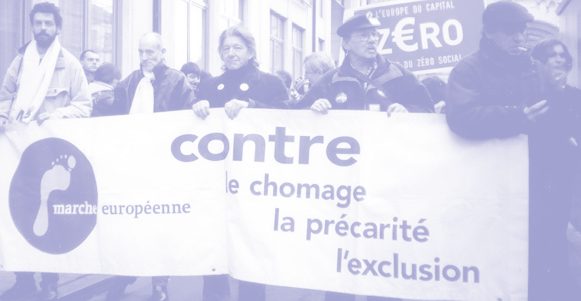 |
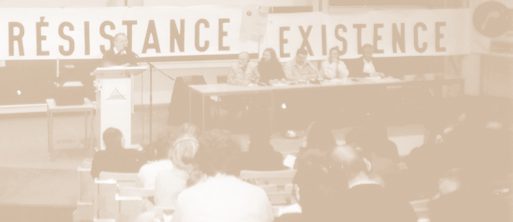 |
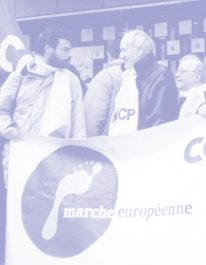 |
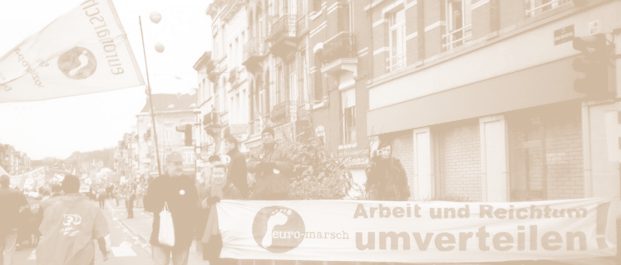 |
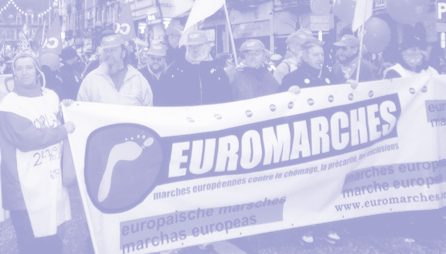 | ||
European Marches
|
||||||||||||||
| ||||||||||||||
A step in our marches :
|
||||||||||||||
Enlargement: a new issue for EuromarchesSince 1997, we, activists from organisations of the Euromarches, from all European countries, gather to march, to debate, to build this Europe of the peoples which one day will have to overtake today's Europe, dominated only by the ideology of capitalism. This conference was a step further in our marches which we hope will help us to make new steps tomorrow with a lot of others. Opening sessionModerator: Christiane Maigre (Euromarches, Belgium), Piet Van der Lende (Vereniging Bijstandsbond, Amsterdam) The rights of the unemployed and precarious: a stake for the democrats and the workers of the enlarged European Union Anke van der Vliet, on behalf of Vereniging Bijstandsbond, Amsterdam 
Dear friends and comrades On behalf of the Dutch delegation and of the Euromarches coordination, I wish you a big welcome to this conference on the future of the Social Rights in an enlarged Europe. In addition to the celebration of May Day, the first of May will leave a mark on the E.U. enlargement. From this day, a large section of the people of Europe will face an uncertain future in a common economic, and political framework. At the Lisbon Summit, in 2000, part of this future was sealed. The purpose of this summit was to be in 2010 at the top of the global fight for competitiveness with a highly developed, knowledge-based economy. With the Nice and Lisbon summits, the aims of high levels of social security cover and full employment were declared. However, progress in these fields must be in accordance with the priority of competitiveness, although one can doubt that one really conditions the other. For us, Euromarches, as a constituent part of the alterglobalisation movement, the prospect of a social Europe is of the utmost importance. The European political union is not an end in itself, but a possible way towards a better world in which the processes of global integration in the economical, political and social fields fit together and grow in a democratic way. For the moment, political integration follows the agenda fixed by capital and free trade. Political and social integration are far behind. These differences in pace generate lots of problems and contradictions. We have to keep in mind this background in examining the EU enlargement and its major consequences for social issues in the former countries as in the new ones. When we speak of the major consequences of enlargement, we feel worried about the political responses which will be given to the entrance of a great number of states, people, and economies with a very low level of social protection. We would hope for a reallocation of the structural funds to the acceding countries to help them to have their economy and their infrastructures restructured, maybe also to improve the social protection of their people. Another possible effect is the convergence of the existing social protection systems and their financing. Given the lower level of entering countries, this might lead to a lowering of the current levels of social protection in the former EU countries. A third possible effect is related to the consequences of free circulation of the citizens of Europe and the open market process. To start with this third item, we can observe that Austria and Germany will close their frontiers to the citizens of new countries. In the Netherlands and in France, we can note the same xenophobia and chauvinistic reactions. In Ireland and in Great-Britain, the labour market will be open to everyone but social protection will only be given to the citizens of the former Europe. Similar measures are under discussion in other countries; always in the background are considerations to « social tourism ». The people who voted to enter the EU saw the rules of the game change from one day to another. Their market is welcome, not their workers, their poverty and their misery. That way, EU enlargement seems to be the lever making it possible to skip some of the boundaries of the traditions of liberal democracy. Nowadays, even among the Greens and the Social democrats, formalizing the current, the unequal share of welfare and institutionalizing a two speed society is proposed. In order to justify this fact, xenophobia and chauvinistic arguments are being used in a rhetoric where politicians want to be seen as guarantors of the interests of their voters as consumers and taxpayers. Today, the principle of the free movement of goods and people makes it compulsory for us to worry about the satisfaction of fundamental human needs (or their un-satisfaction) and of an equal share in wealth. According to us, a social Europe is a Europe with open borders and rigorous rules on social protection of the most vulnerable people and of insecure workers living with low income. As far as the convergence of social rights and social protection is concerned, it is clear that the EU Constitution draft , written by Valéry Giscard d'Estaing, did not ensure a basis of solid principles on social protection. Actually, the right to housing, to an income, health, employment, pensions and work security were not given the same attention as capital interests did. This text, in its neo-liberal rhetoric, asserts that each problem has its solution in the efficient functioning of the market. In such a design, social protection is by definition sacrificed. As for the convergence of the rules of taxation and their control, a clear tendency to share the revenue in a more and more unequal way can be observed. Taxation rate of high income jumped from 62,3% to 48,3% on average, the value added taxes increase everywhere, profit taxes fell from 44,8% to 31,8%, approaching the very low average of the entering countries which is 23,6%. At the same time, social standards have deteriorated everywhere and spending on public services has stagnated. Everywhere, the tendency is towards the privatisation of pension systems. In view of these negative evolutions, we can see politicians confined to a framework of opening borders to capital and trade, and not to workers. While the neo-liberal view blames or neglects the victims of the free-market competition, international capital does what it wants to do, at the vast majority of people’s expenses. Finally, we will probably see a reallocation of structural funds in favour of the entering countries. One can wonder if these funds will offset the damage done to local production in an open market. As these funds are maintained at their current level, such a reallocation will cause contradictions and conflicts in such sectors as agriculture; for farmers as for farm workers, which could feed chauvinistic and racist reactions in return. Dear friends and comrades, Today we will focus on EU evolutions on global and national scales in relation to the enlargement process. Four working groups will look at different issues from four points of view:
We will then draw the conclusions and consequences in terms of strategy and the proposal of alternatives. Dear friends and comrades, It is clear that the leanings of prevailing forces are opposed to our aspirations for a better world. To protect the interests of the fewest, thousand of millions are spent on xenophobic measures, on terror and war. We find encouragement in the rise of the altermondialist movement to which we want to contribute in our way. Together, we will fight against neo-liberal forces. By joining our forces together, we will overcome our weaknesses which arise For an East – West solidarity of the social movements from our dispersion and from our too « localist » projects and we will find new forces through international solidarity. The development of social forums all over the world encourages us. In this spirit, we welcome the participation in our work of our comrades from Central and Eastern Europe. Tous Ensemble!
|
Content | |||||||||||||
|

02/08/04
|
||||||||||||||